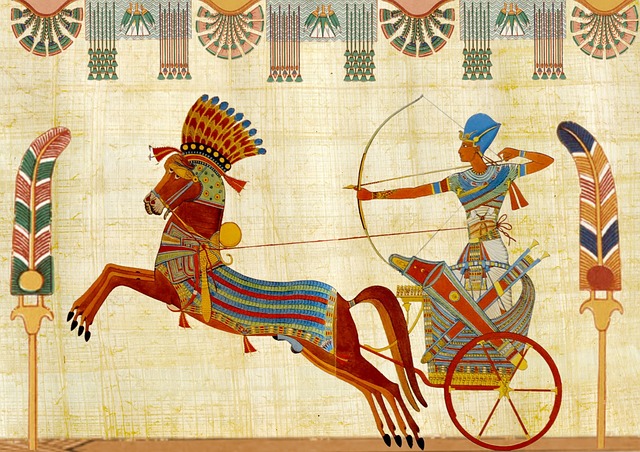When I’m presented with an analogy or example in the Bible that is culture-bound, I have three approaches:
- Dig deeply into that culture so I can unearth everything it would’ve meant to the people at that time.
- Think of contemporary versions of the analogy or example.
- Try to tease out the ways people are the same, then and now.
I did each of those things while working with the kids at church a few Sundays ago.
Dig deeply into the culture
The Sunday school kids heard the story of the judge Deborah; specifically, Deborah giving Barak the what-for (in Judges 4) when he didn’t hop to it when God called him to battle, which set up Jael (a woman!) to kill the enemy general Sisera. We talked about views of gender in that culture, but in the passage there was also a mention of iron chariots, or chariots fitted with iron. Normally, this reference would pass right by, but because of the research I did for my David and Saul stories, I knew that it was meaningful: the Israelites at this time could not make iron, and since iron was the hardest metal available, much harder and able to hold an edge better than anything the Israelites had, the Israelites were at a technological disadvantage in every battle. The other side always had better weapons and better gear, tougher and sharper and longer lasting.
But Israel had the Lord, who could throw armies into confusion so the better weaponry made no difference.
It wasn’t until King David’s time that they conquered the Philistine towns with a monopoly on iron production and they could finally pull even, technologically, with their remaining enemies.
I love knowing and being able to pass on details like that, and some of the kids seemed interested by that nugget. I even got an, “Oh, yeah,” when I said that Israel had the Lord 🙂
Come up with our own analogies
Then the 4th-grade-and-up Children’s Worship room read this in our liturgy from Psalm 130:5-7:
With all my heart I wait for the Lord to help me.
I put my hope in his word.
I wait for the Lord to help me.
I want his help more than night watchmen want the morning to come.
I’ll say it again, I want his help more than night watchmen want the morning to come.
Israel, put your hope in the Lord,
because the Lord’s love never fails.
He sets his people completely free.
Since none of the kids had ever been night watchmen, I asked them to think of things from their lives that they couldn’t wait to be over. Here are their offerings, incorporated into the Psalm:
With all my heart I wait for the Lord to help me.
I put my hope in his word.
I wait for the Lord to help me.
I want his help more than I want the school day to be done,
even more than I want math class to be done.I want his help more than I want to get going when my parents are talking foreeeeever.
I want his help more than I want to leave when parents are getting their hair done.
I want his help more than I want to get better when I’m sick.
I want his help more than I want to stop the pain when the comb catches a tangle in my hair.
I want his help more than I’m impatient to eat when people pray for a loooong time before a meal.
Israel, put your hope in the Lord,
because the Lord’s love never fails.
He sets his people completely free.
Tease out similarities
I take every opportunity to show kids (and remind myself) that the people in Bible times were people like us, with frustrations and anxieties and joys and worries. It’s so easy to blow through the familiar poems and stories without thinking of the Israelites as people we can relate to.
Sometimes it can take perseverance on my part, like when my Sunday schoolers insisted that they never whined. I fixed them with a skeptical look and said,
Really? None of you have ever said to your grown-up, “Please can I have that thing. I really want it. Can I have it? I promise I’ll clean up my Legos. I’ll never ask you for anything ever again, please, please, please, please….”
They laughed and had to admit they whined–and instantly had more understanding of how the Israelites wore down Aaron until he made them that golden calf while Moses was up the mountain communing with God.
The perseverance is always worth it, though.
I’ve heard from a couple of people who have also been doing the “write your own Psalms” thing with groups at their church — if you do, please let me know. I’d love to hear about it!
